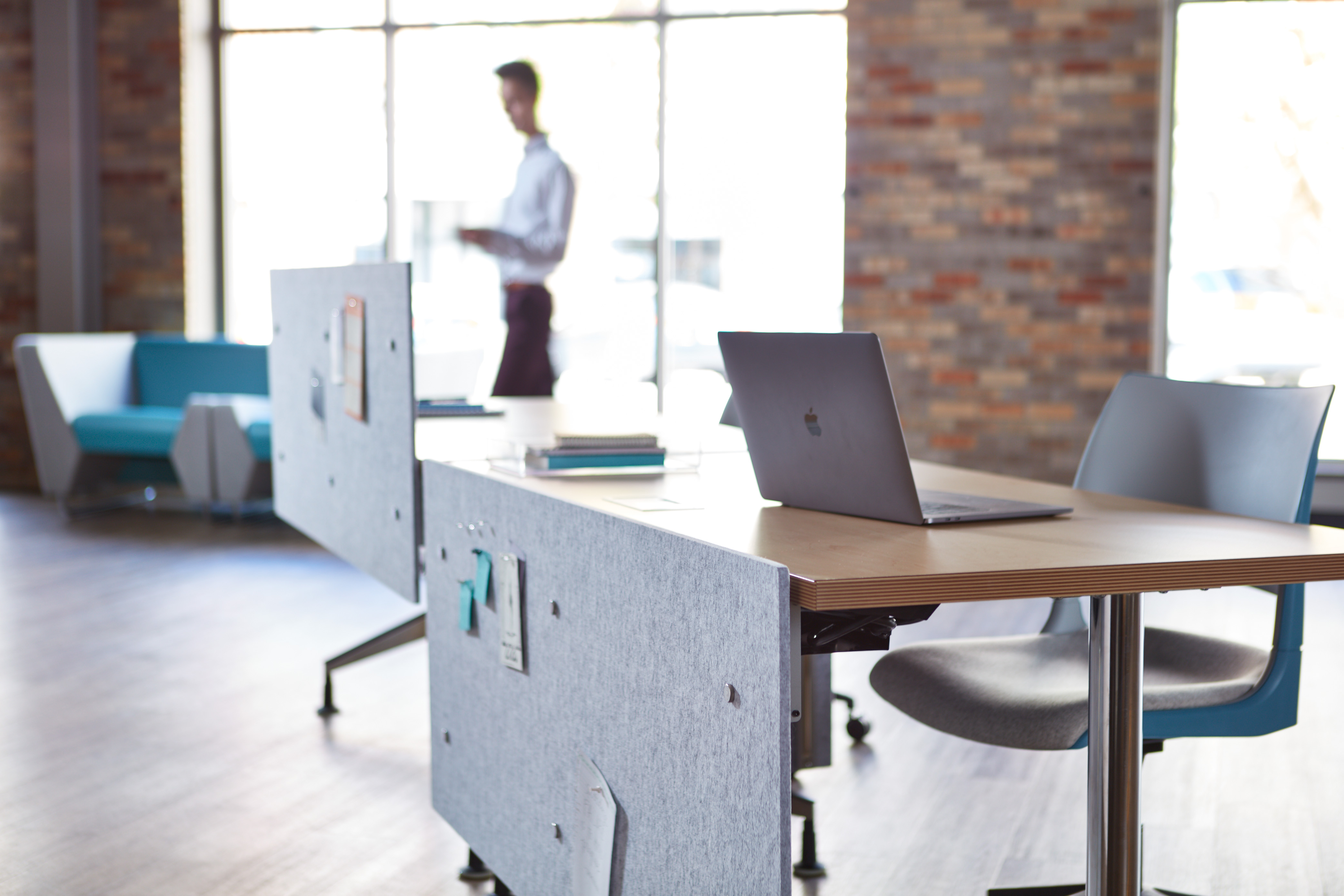- What's New
- Pricing & Purchasing
- Lead Times
- Literature & Samples
- Services & Warranties
- Careers
- Find a Rep
KI Creates Adjustable Screen that Offers Personal Space in Office Layouts
This is an excerpt from an article. To view full article, click here.

As office design shifts towards a more open environment, many workers are experiencing a feeling of vulnerability.
Seventy percent of offices in the U.S. boast an open-plan design, but that doesn't mean everyone enjoys working in that type of setting, according to a recent study by Commercial Cafe. More than 40 percent of those surveyed said they prefer a private office.
Humans have an innate need to feel in control of their personal space. Neuroscientist Michael Graziano, in his new book, "The Spaces Between Us," explains how humans have a sort of second skin, where the brain computes a buffer zone of two or three feet wide around the body.
KI took this information to the drawing table and developed the Universal Height-Adjustable Screen for office desks and height-adjustable tables. At its full height, the screen provides complete visual privacy. When fully depressed, the screen virtually disappears, to create an inviting, collaborative space. The screens quietly raise or lower to the desired level of privacy with a simple pull or push.
"It's not something that we came up with intuitively, it was really driven by the market," Says vice president of design and product marketing Shawn Green.
"One of the things we see when the panel heights come down and workers are subjected to open space, there's this feeling of exposure that people have, and they want their space division element added back in. We put ourselves in a very empathetic standpoint of our customers. If I were in this environment, how would I feel? What would be my experience? How would I relate to the people around me?"
KI's Universal Height-Adjustable Screens are made from acrylic and PET recycled materials and come in six different sizes, from 23 inches by 24 inches to 70 inches by 24 inches. They also are offered in 30 paint colors, from the classic cool grey to rubber ducky yellow and zesty lime. Green describes the screen as "light, and the felt-covered panels add a nice acoustic element to buffer sound."
The screens are easy to install and use. Designed with a spring like tape measure, the screen moves up and down easily with two fingers and won't pinch or grab.
"The last thing we want to do is make something that facilites have to come in and adjust," Green says. "Packable workstations, user-adjusted workstations, user-controlled space, easily manipulated, intuitive, no tools required, not loud or clunky or disruptive in any way – we're pushing these ideas further on the horizon."
As long as there's enough room, the screen's bracket can be attached to just about anything. KI also can modify the screens to fit existing furniture.
Though the screen is simply designed, it has a handful of patented features and varied height options. Last June, the screen won NeoCon Gold in the space division elements category.
"When it comes to work environments, we believe workers need four things to be successful – places where you can share, focus, create, and relax," Green says.
"Every company needs some of each. We've seen ratios change over the years, but that's fundamentally who we are. To say that things like collaboration or developing office culture are trends, is not really fair. It took collaboration to build the pyramids and to send a man to the moon"
In the past, workspace used to be very much about status, Green notes. The higher up you were, the better the workspace you got. These days, "that's all out the window," he says. "Were seeing programming now where it's 70 percent public space, 30 percent individual. It used to be completely opposite."
Employers are starting to realize people are indeed, their most valuable asset, and they have to be more nimble and responsive.
"There are people out here today looking at the total picture, not just the paycheck," Green says. "What are the company values? What is the space like? What is the culture like? Anytime, we can work intimately with clients and understand how their functional and cultural needs are tied into their brand, we feel successful."
KI, which has been in business since 1941, is an, employee-owned contract contract furniture company located in Wisconsin that manufactures furniture for the office, health care, and education sectors. Its first product was the standard folding chair (Green challenges readers to flip over the old metal folding chairs in their garages or church basements to see if there's a KI logo underneath.).
Historically, the company has been known for robust, durable design.
"We've really evolved as an organization," Green says. "Within a very competitive marketplace, one of the things we subscribe to is that innovation is discovered in scarcity, not bounty. We push ourselves to find a better way to do more with less"
KI averages about six new products a year and has won industry design awards for the past five years.
"Our success is based on the idea that we are a thoughtful furniture company; we approach things differently," Green says. "We're number six in the industry, so were not insignificant in size or revenue, but we play by a different set of rules." WPM